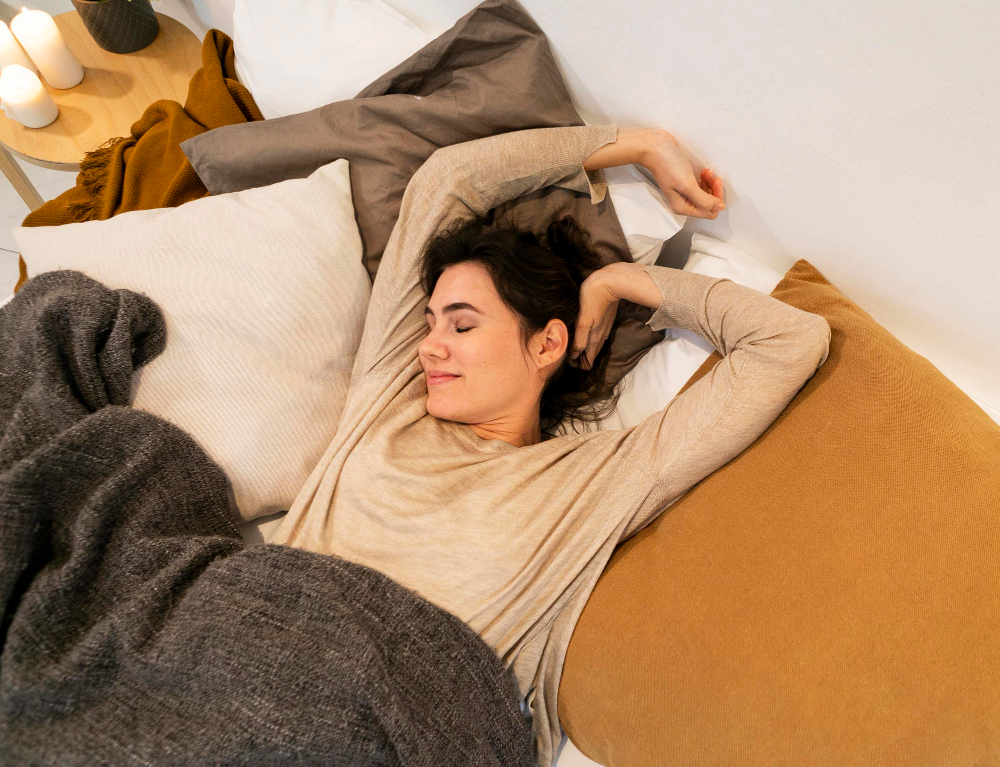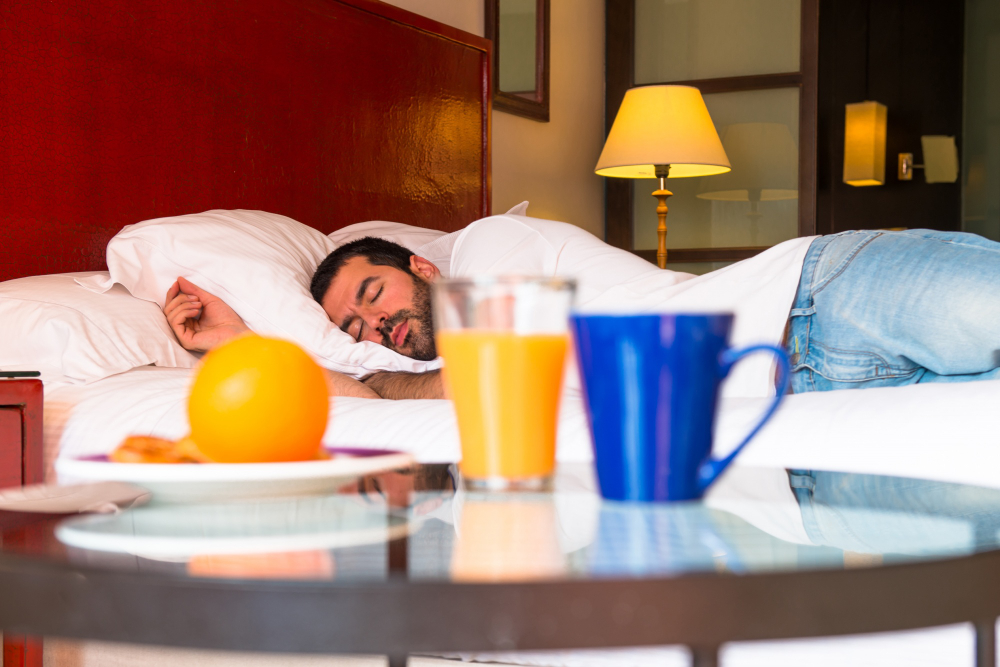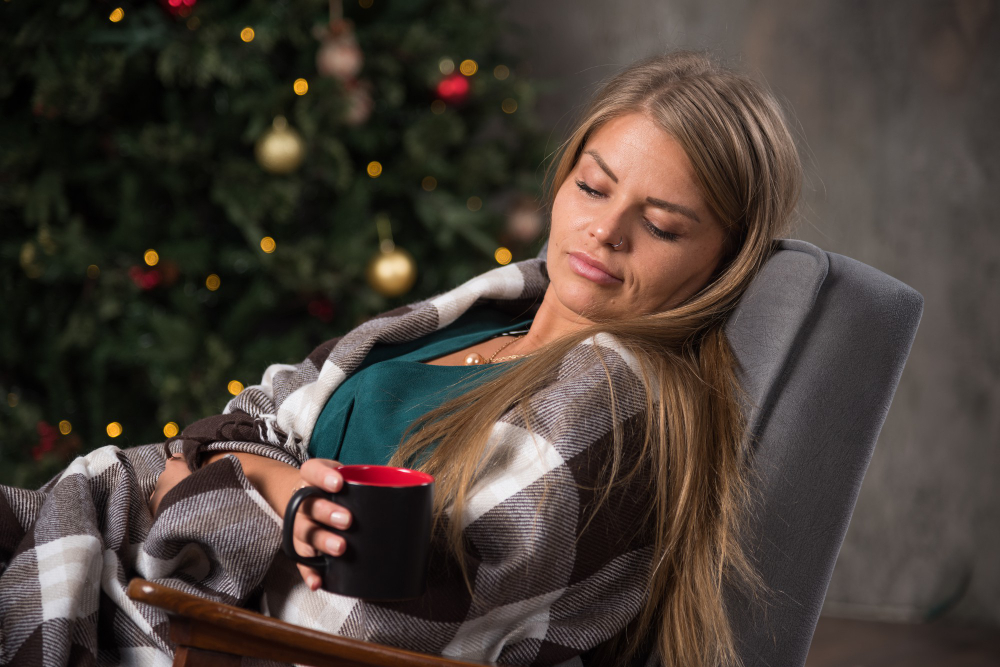Let a relaxing beverage transport you to la-la land.
Does getting a good night’s sleep often feel elusive? There’s an easy activity that you might not have thought of—your choice of beverage.
The right beverages can make a significant difference in achieving that restful slumber. This guide highlights drinks that promote relaxation and improve sleep quality, as well as those that may keep you tossing and turning at night. From soothing herbal teas to the comforting warmth of milk, discover how you can enhance your bedtime routine with the right choices.
Ready to transform your evenings and drift into peaceful sleep? Let’s explore the best bedtime beverages together!
Stay Hydrated with Water
Water is the best beverage to drink throughout the day and right before bedtime. Recent statistics from the Centers for Disease Control and Prevention (CDC) show that U.S. children and adolescents drank an average of 23 ounces of plain water daily, while U.S. adults drank an average of 44 ounces. With zero calories, water won’t make you feel full, and it helps prevent dehydration, which can cause:
- Constipation
- Foggy thinking
- Kidney stones
- Moodiness
- Overheating
Dehydration has also been linked to shorter sleep duration in adults, particularly when they get less than eight hours of sleep per night. Most adults need seven to eight hours of quality, uninterrupted sleep to feel fully rejuvenated the next day.
Caution: If you regularly sleep less than seven hours a night and suspect dehydration may be affecting your sleep schedule, it’s a good idea to speak with your healthcare provider if you have concerns.
The Calming Benefits of Herbal Teas
Herbal teas, such as chamomile, lavender, and valerian root, are renowned for their calming properties. They can promote relaxation and significantly improve sleep quality. Incorporating them into your bedtime routine can help you unwind and fall asleep quicker.
Chamomile Tea
Chamomile is renowned for its healing properties and is frequently used to promote sleep. The herb contains a flavonoid called apigenin, which helps calm the mind, relax the body, and prepare you for a restful sleep. You can also create your own herbal tea concoction with chamomile as your base and blend it with warm milk, cinnamon, ginger, honey, nutmeg, turmeric, or other sleep-inducing herbs.
Caution: Chamomile should not be used by pregnant women, babies, or children without consulting a healthcare provider. It’s also known to have blood-thinning effects.
Lavender Tea
Lavender is beneficial for reducing pain and inflammation, stabilizing moods, and reducing anxiety and depression. Sipping lavender tea before bed can help you relax and keep racing thoughts at bay before heading to bed. Lavender is labeled “generally recognized as safe” by the U.S. Food and Drug Administration (FDA), and studies have shown that its use can improve sleep quality in postpartum women.
Caution: Consult a healthcare provider before using lavender if you’re pregnant or breastfeeding.
Valerian Root Tea
Valerian has a long history as a sleep aid, and the tea is made from the roots of the plant rather than the leaves. Today, it’s most commonly used to ease the symptoms of anxiety, depression, insomnia, and stress.
Caution: Studies on valerian root are limited, and common side effects include headaches, upset stomach, uneasiness, and vivid dreams.
And More Teas!
Have a favorite tea that usually comes chock full of caffeine? Give the decaf version a whirl!
Decaffeinated Spiced Chai
This earthy, aromatic tea contains a blend of sleep-inducing herbs, including cardamom, cinnamon, ginger, turmeric, fennel seeds, and nutmeg. Not only can decaf spiced chai help you sleep, but it also offers additional health benefits, including improved digestion and reduced muscle pain. This makes it a comforting and beneficial choice for your bedtime routine.
Decaf Green Tea
Unlike regular green tea, decaffeinated varieties contain minimal caffeine, which helps avoid the stimulating effects that can interfere with rest. Packed with antioxidants, decaf green tea may also promote relaxation and support overall wellness. The amino acid L-theanine found in green tea can contribute to a calming effect and improve sleep quality.
Caution: Some people can have adverse reactions to a small amount of caffeine such as withdrawal symptoms similar to full strength tea. Listen to your body and mind or consult a healthcare professional before trying decaffeinated teas for sleep.
Warm Milk and Honey: A Timeless Classic
Drinking a cup of warm milk before bed is attributed to both scientific research and psychological factors as a means to enhance sleep quality. Milk contains the amino acid tryptophan, which helps in the production of serotonin and melatonin. Serotonin impacts mood, cognitive reasoning, and memory, while melatonin helps you relax and get ready to sleep.
Childhood memories of our parents or grandparents giving us a glass of warm milk to help us fall asleep could explain the psychological connection to drinking a glass of milk at bedtime. These memories can trigger a soothing sensation that helps us relax and may reduce pre-sleep anxiety.
Add honey or vanilla to enhance the flavor of warm milk and enjoy extra health benefits. Lastly, if you’re concerned that milk might cause snoring, that myth has been debunked!
Caution: Avoid warm milk and honey if you’re lactose intolerant or sensitive to dairy.
Drinks to Avoid Close to Bedtime
When it comes to achieving a good night’s sleep, the beverages you consume before bedtime can significantly impact your rest. Here are some drinks to steer clear of in the evening:
- Caffeinated Beverages
- Alcohol
- Sugary Drinks
- Acidic Juices
Tips for Creating a Relaxing Bedtime Beverage Routine
First and foremost, it’s important to avoid consuming beverages right before going to bed to avoid waking up in the middle of the night to use the bathroom. Experts at the Cleveland Clinic suggest limiting beverages such as water, tea, or juice to one glass or less at least two hours before bedtime. Take only small sips if you need something to drink. Avoid alcohol at least four hours before bed and limit yourself to no more than one drink per night to prevent disruptions to your sleep patterns.
The Sleep Disorders Center at UCLA Health in Los Angeles recommends that older adults, individuals with a sensitive bladder, and those taking medications that can increase urination pay particular attention to the timing of evening beverages. Consider avoiding beverages other than a few sips three to four hours before your bedtime.
Are you ready to create a calming bedtime beverage routine to help you unwind and improve your sleep quality? Here are a few more suggestions:
Set the Atmosphere
Make your evening beverage routine an experience. Dim the lights, play soft music, or light a soothing candle to create a serene sleep environment. This sets the tone for relaxation and helps signal to your body that it’s time to wind down.
A Soothing Preparation
Take your time when preparing your beverage. Whether you’re brewing tea or warming up a glass of milk, focus on the process. A soothing approach enhances the experience, allowing you to disconnect from the day’s stress while you prepare for bed.
Create a Signature Drink
Who said bartenders and celebrities are the only ones with signature drinks? Experiment with different bedtime drink recipes until you find a go-to bedtime beverage you love. This could be a unique herbal blend or a cozy spiced milk. Having a signature drink can make your entire bedtime routine feel special and give you something to look forward to at the end of the day.
Incorporate Mindfulness
Mindfulness practices can further enhance relaxation, helping to calm both your mind and body. While enjoying your drink, take a few moments to practice deep breathing, complete a brief meditation, or stretch lightly.
Avoid Distractions
Use your beverage time as an opportunity to disconnect from screens and digital distractions. Instead of scrolling through your phone, focus on the present moment and enjoy the flavors and warmth of your drink. This digital detox can be crucial for winding down and preparing yourself for a good night’s sleep.
A Few Sips for Better Sleep
Your beverage choices can significantly impact the quality of your sleep. By incorporating calming herbal teas, warm milk, or simply a glass of water into your evening routine, you can create a soothing environment that promotes relaxation and restful sleep. Avoiding stimulants and being mindful of your hydration will help you drift off more easily and wake up rejuvenated.
So, why make these delightful drinks a part of your nightly ritual? Cheers to sweet dreams and peaceful nights!



